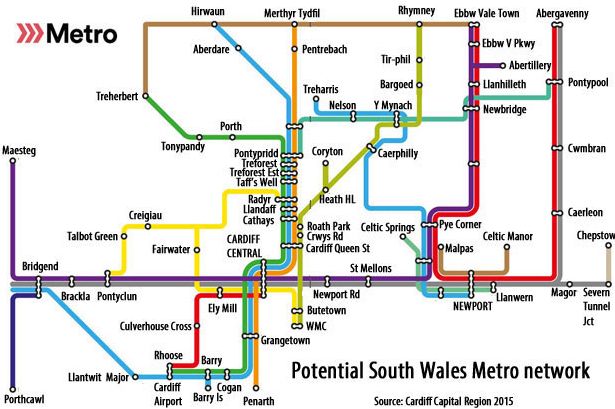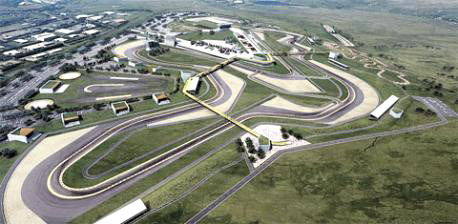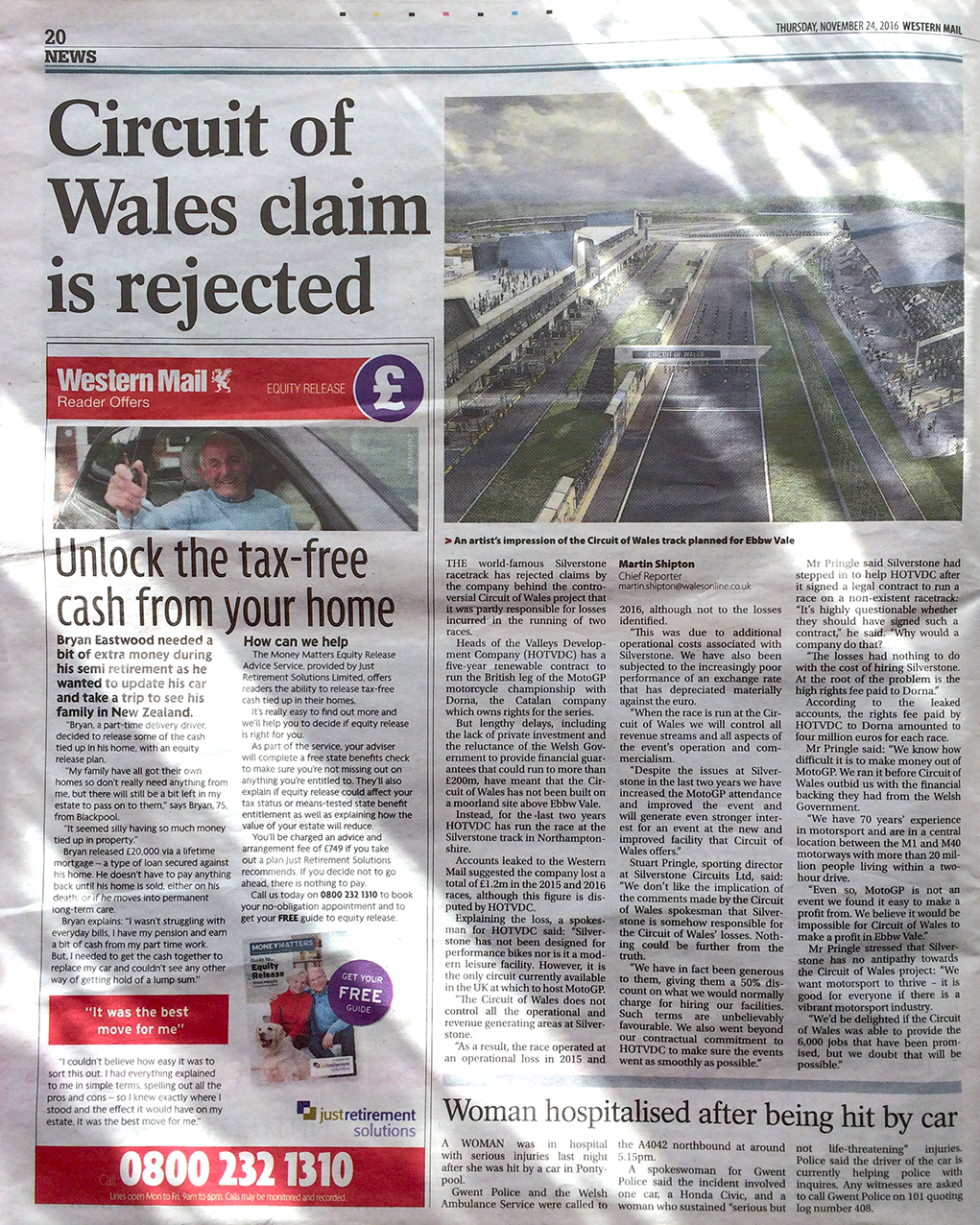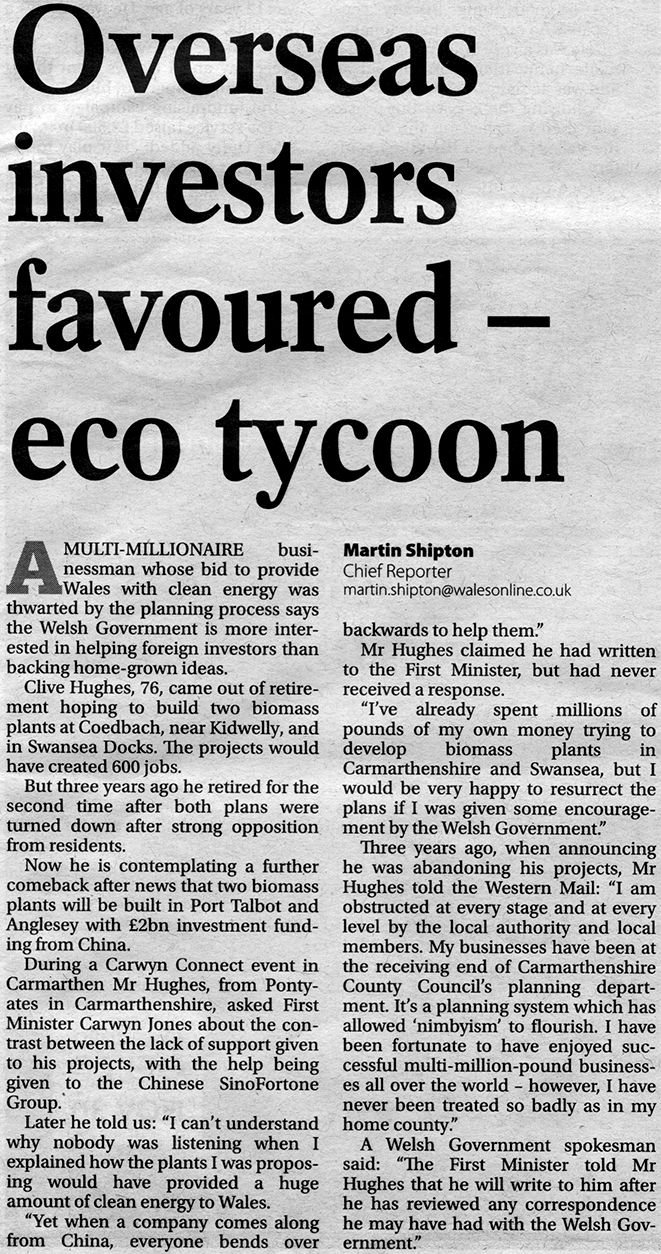When the incoming Labour government offered us devolution in 1997 I didn’t get too excited, but still, if Kinnock and George Thomas are against it, I thought, then it might have something going for it. So I voted Yes, but only because I saw devolution as a step on the road to independence. Encouraged by Ron Davies calling devolution “a process, not an event”.
Once the Yes vote had been arranged everyone assumed that the new Assembly would sit in Cardiff City Hall, but a dispute over costs blew up that was never satisfactorily explained. I believe that this spat was contrived, dreamed up in London to compensate Associated British Ports for not getting the planned opera house designed by the late Zaha Hadid.
It was no coincidence that the driving force behind the opera house project – as head man at Welsh National Opera – was Nicholas Edwards (later Lord Crickhowell), Secretary of State for Wales under Margaret Thatcher, and chairman of Associated British Ports, the company that owned Cardiff docks.
With Cardiff City Hall ruled out we had a national ‘competition’ to find a replacement. The ‘winner’, in the sense that it was the only entrant to meet the requirements of price and immediate availability, was Swansea’s pre-war Guildhall designed by Percy Thomas. But in April 1998 Secretary of State Ron Davies announced that the Assembly would be sited in Cardiff after all.

Everyone in Swansea – and indeed people in Cardiff and the rest of Wales – then realised that the ‘competition’ had been a charade, and that the Assembly was going to Cardiff even though there was no site for it. As late as 2001 Swansea politicians were still claiming a conspiracy.
Further, I have always believed that Ron Davies, being vulnerable to pressure, was ‘leaned on’. His justification at the time for ripping up the ‘competition’ rules and awarding the prize to Cardiff was that to have located the Assembly in Swansea would have undermined Cardiff’s status as capital of Wales. So why have a ‘competition’?
Without a building for the Assembly it was decided to lease Crickhowell House down Cardiff docks, named after Lord Crickhowell. The ‘Welsh’ Government is still leasing Crickhowell House, now renamed Tŷ Hywel. You might be interested in the figures.
From 1999 to 2012 the public purse splurged £40,654,093 on leasing, maintaining and improving the building. The current lease runs until 2032 at an annual cost of £2.3m plus VAT. When I submitted my FoI in 2013 the building was owned by Crick Properties, but was bought in March 2014 for £40.5m by a company registered in the British Virgin Islands.
The final bill for leasing and maintaining this building will be well over £100m, after which it will still belong to whoever owns it at the time. We could have had a new, purpose-built building for a tenth of that figure. But of course, that would not have suited Associated British Ports and those linked to the company.
The squalid saga of how the public purse was abused in order to transform Cardiff docks into Cardiff Bay for the benefit of Associated British Ports is explained in the Corruption Bay document I put together in 2000-2001.
♦
It’s well over 18 years since Ron Davies announced that the Assembly would be located in Cardiff . . . somewhere. In that time Cardiff – which, incidentally, voted against devolution – has prospered greatly from hosting the Assembly, and gained from politicians and civil servants making decisions that talk of ‘Wales’ but benefit only Cardiff.
To the point where, today, it seems that all investment is focused on Cardiff while other urban areas are condemned to managed decline and our countryside and coasts serve as recreation and retirement areas for England. The north, certainly the north east, is, with the connivance of the ‘Welsh’ Government (acting on the recommendation of a Mrs Hain), being detached from Wales to become commuter territory for Merseyside and Greater Manchester. For some time now, dwellings around Wrecsam have been advertised by estate agents as being in ‘West Cheshire’!

This process of dismembering Wales is made easier by Cardiff’s distance from and indifference to the north east.
Few things illustrate the Cardiff-centricity of contemporary Wales – and more worryingly, how it has become accepted in official circles as the template for all development – than the Cardiff Capital Region project and its associated Metro system.
The City Region is nothing but a scheme for encouraging further investment in Cardiff but, by improving local transport links, it’s hoped that the Valleys and the M4 corridor from Bridgend to the border will feel part of this enterprise. In truth, it’s the formalisation of a city-commuter region arrangement. To dress it up as anything else is dishonest.
That this project has progressed so far with so few objections from those communities being reduced to dormitory status can be attributed to the malign influence of a Labour Party that may be losing its grip but still deals ruthlessly with dissent. Plus the fact that opposition parties seem to share the ‘Everything in Cardiff’ mindset.
To ensure that the focus remains on Cardiff major developments elsewhere in the region may be sabotaged, and this explains the recent attacks on the Circuit of Wales project at Ebbw Vale. These attacks came from the traditional mouthpiece of the Cardiff business community, the Western Mail, and BBC Wales which, as I remarked in Circuit of Wales Revisited, “has as much claim to being our national broadcaster as the Mule has to being our national newspaper”.
♦
Despite my criticisms, what I’ve dealt with thus far is understandable, even excusable, in that it’s the duty of the politicians and the business community of a city to promote the interests of that city.
Of course my absolution does not extend to Assembly Members from other areas who simply nod through every project to promote and enrich Cardiff. Nor does it extend to those who pose as our ‘national media’, or other institutions and bodies claiming to represent the whole country.
Cities, even capital cities, looking out for themselves is one thing, but we have now reached the stage in Wales where Cardiff serving its own interests, and being encouraged to do so by the media and the ‘Welsh’ Government, is working against the interests of the country as a whole.
Worse, we are now seeing the corruption that is almost inevitable when the public life of a country is concentrated in a relatively small city, and when this concentration sees those with the power of patronage and control of the public purse rubbing shoulders on a regular basis – and too regularly in social environments – with those wishing to enrich themselves at the expense of the rest of us. Two examples will help explain what I’m talking about.
First, a case that attracted much attention was the deal to sell off land on the outskirts of Cardiff to a very well-connected group of Cardiff businessmen at a knock-down, agricultural-use price, despite the fact that everybody knew the land had been earmarked for housing. I dealt with this in Pies, Planes & Property Development and Pies, Planes & Property Development 2. Let’s not beat about the bush, this was corruption, pure and simple.
Next, have you ever wondered why Wales – unlike Ireland and Scotland – does not have a national cricket team? The answer is that we are represented by England. No, honestly, and to be precise, by the England and Wales Cricket Board (though the ‘Wales’ bit is never used).

In 2015 Labour First Minister Carwyn Jones said it was an honour to welcome the Test match between Australia and England to Cardiff, adding: “Attracting major events not only boosts our international profile, but has clear benefits for our economy”.
Two points: First, a national team would boost our ‘international profile’ far more, because many people around the world now believe that Cardiff is in England; second, how much of the money generated by the Test match did other parts of Wales see?
Of course, at one time, we did have a national cricket team, but that was before Glamorgan County Cricket Club and others surrendered to England in order that Cardiff could enjoy the publicity, the prestige, and the revenue, from hosting England ‘home’ matches. Another example of the counter-devolution strategy at work and another step towards Englandandwales.
Another way Wales loses out to Cardiff is in the exodus of too many of the brightest and best from other parts of the country. ‘Ah, but the same thing happens in Ireland’ shout Cardiff’s defenders. Not really. The fastest growing cities there are Cork and Galway, and perhaps more importantly, Donegal and Kerry, Sligo and Roscommon are not being overrun by tens of thousands of retirees, problem families, good-lifers, hippies, paedophiles, white flighters and tourist trappers.
The economic imbalance in Wales that makes Cardiff so attractive to our young people deprives many rural communities of their future leaders, their opinion-formers, those who might challenge the invasion taking place. Coincidence, no doubt.
♦
We have reached the stage now where that economic imbalance is so severe, and being exacerbated year on year, that those who direct things in Cardiff – including those who not so long ago would readily display their contempt for ‘Welshies’ – are quite open about their long-term strategy of positioning the city as a medium-sized provincial English city, in competition with Bristol, Sheffield, Newcastle and others. Slowly but inexorably Cardiff is turning its back on Wales.
For Cardiff has the advantage that, as capital of Wales, it can always argue that projects in the city are ‘national’ in importance, and being done for the benefit of 3.2 million people. Which makes it odd that Plaid Cymru politicians get exercised over Crossrail 2 and HS2 being described as ‘national’, yet seem oblivious to the same thing happening under their noses in Cardiff.
Though sometimes the brew gets really heady and ambition stretches beyond competing with Sheffield, proven by an article this week by Siôn Barry, Business Editor of the Wasting Mule, whose brother Mark is the brains behind the Metro system. Barry quotes some estate agent – a profession renowned for its scrupulous avoidance of exaggeration and misrepresentation – who believes that Cardiff can become a “global capital”.

Think about that. We are asked to believe that a city of less than 400,000 people can compete with Tokyo and Paris, Buenos Aires and Beijing. It’s laughable; with the laughter ratcheted up to hysterical level by the fact that Cardiff’s just a provincial centre, and the full idiocy is realised by remembering that those pushing this bollocks, at the Wasting Mule and elsewhere, oppose Welsh independence, without which Cardiff is not, and never can be, a real capital.
This kind of stuff gets hyperbole a bad name; it borders on the delusional. Young Matt Phillips of Knight Frank clearly needs help, but rather than waste money on some expensive treatment I suggest that he be slapped around the head with a freshly-caught halibut until he recants. (It never fails.) As for those who repeat such nonsense, well, they want to believe it, but worse, they also want you to believe it.
Welcome to the never-never world of devolution. An estate agent tells a journalist that Cardiff is about to go head-to-head with Paris, this is repeated as gospel by our ‘national newspaper’, yet it takes place to the backdrop of Wales being colonised and by other means having its identity eroded as the prelude to complete assimilation into England.
While it yet lasts, this fantasy I’ve described bears some resemblance to a corrupt Third World country where all the goodies are concentrated in the capital and the provinces are allowed to rot; what’s missing is the dictator and his extended family and friends ripping off the state finances, but standing in we have ‘Papa’ Jones and his Labour Party, plus Labour’s cronies in the Third Sector and gangs of well-connected businessmen.
As I said at the start; when I voted Yes in 1997 it was only because I saw devolution as the first step on the road to independence. Devolution has been a complete failure in that regard, and it has even failed as a devolved system – apart from the growth of Cardiff. And this week we were told that even the devolution some thought we had is worthless because Westminster can overrule the ‘Welsh’ Government any time it chooses.
To remedy the situation in which we find ourselves Wales needs to be ‘re-balanced’. I believe that the quickest and surest way of achieving that necessary objective is by moving the Assembly out of Cardiff. Which is why I have launched a petition urging that the Assembly be moved to Aberystwyth. Click here to sign that petition.
♦ end ♦
UPDATE 20.12.2016: Well, bless my soul – Plaid Cymru agrees with me!










